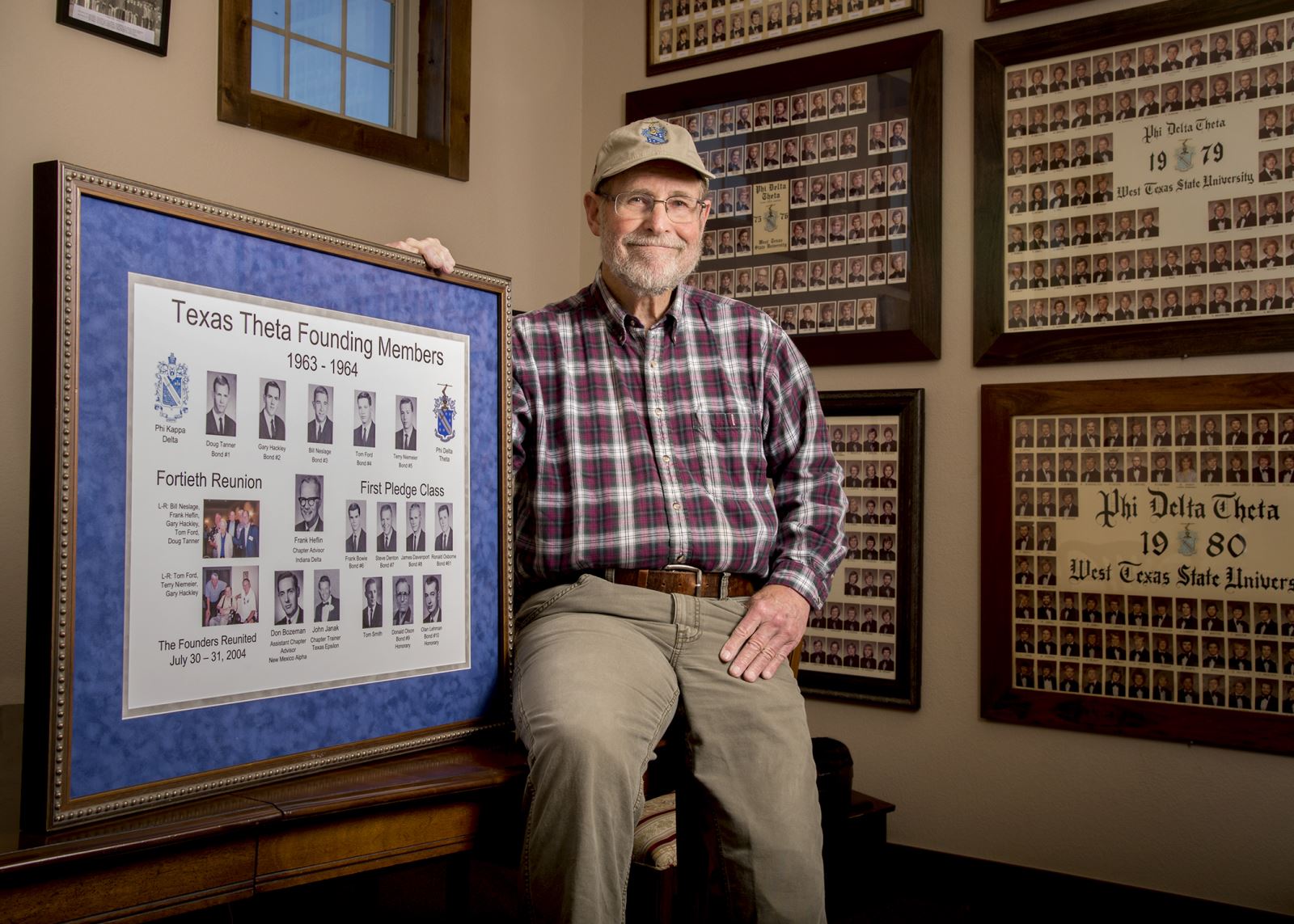- Education
- Jon Mark Beilue
- Alumni
An Iron Phi for WT's First One
University's original Phi Delt, despite leg loss, swims nearly 3,000 miles
As Doug Tanner describes it, he spent about 40 years wandering in the wilderness before returning home.
Before leaving the area in the 1960s, he was a student at then-West Texas State, even making a little history in the process. Upon his return, after what was nearly a life-ending event became a life-changing event, he has challenged himself in a way few amputees ever have.
Back in the early 1960s, after graduating from Amarillo High, Tanner found himself at WT after attending Texas Tech for one and one-half years. He also found himself in a history class under Frank Heflin, a soft-spoken, serious-minded professor from Alabama. He took an interest in Tanner.
“Before I knew it, I had switched my major to history,” Tanner said, “which has no practical application but in the world of learning is pretty important.”
Heflin was also a Phi Delta Theta fraternity member from his days at Franklin College in Indiana. Tanner had never been all that impressed with the fraternity scene at Tech – sort of a mob scene, he said, that he didn’t really care for.
But Tanner saw another side of the fraternity through Heflin, the leadership and service aspects.
“There was kind of a building up of gentlemen that struck a chord with me,” Tanner said.
There were four fraternities and four sororities at WT at the time, but when Heflin wanted to start a Phi Delt fraternity with hopes of getting a national charter, Tanner was all in.
Tanner was among five who wanted to form the fraternity under Heflin’s guidance. They chartered one in the fall semester of 1962 and got some help on orientation from Phi Delts at the University of New Mexico.
Tanner graduated in May 1964 and went to work on his master’s. That winter, Tanner got Bond No. 1 as WT’s first Phi Delta Theta member under the national charter. The fraternity began in the 1880s at Miami (Ohio) University.
“Me and another guy flipped for Bond No. 1 – it was as simple as that,” Tanner said. “Frank liked to do things that way.”
Soon after, Tanner left the Panhandle. On Dec. 7, 1979, he was working at the University of Virginia. Leaving campus, his car was smashed by a drunk driver who ran a stop signal.
“It was really assault with a deadly vehicle,” Tanner said.
The impact crushed both legs, and he spent months hospitalized. The left leg never properly healed. While living in Denver in 1981, a doctor believed it best to amputate below the knee.
Tanner soon began swimming as part of his recovery, an activity he could pursue with the help of a swim fin on his left stump. He swam in lakes and in indoor pools in the Denver/Boulder area. He continued that after he moved to Maryland.
Upon his retirement in 2008, Tanner returned to Amarillo for the first time since he left in 1966. Swimming was still a passion, and he continued at the Amarillo Town Club, but with a twist.
There was a 100-mile board next to the pool where swimmers could chart their distance with a grease pencil. It never occurred before to Tanner to chart his mileage. So 10 years ago – Jan. 23, 2009 –to be exact, Tanner began to do just that.
By the end of the year, he swam 200 miles. One mile at the Town Club is 36 up-and-back laps that take between 50 and 55 minutes.
Then he upped it to 300 and further. In 2012, he got the idea that if he were going to swim all these miles, make it worthwhile. He started to swim for a cause.
The first Phi Delt at WT took up the Iron Phi Challenge, which is an athletic feat that raises at least $1,000 for the ALS disease. Baseball great Lou Gehrig, a Phi Delt at Columbia University, died of ALS in 1941.
Tanner became the 148th out of now 800 nationally to earn an Iron Phi. He raised $1,300 by swimming a mile for every $5 donation. But it’s gone beyond that. In 2016, his swimming miles raised $3,000 for the Texas chapter of Mothers Against Drunk Driving.
About five years ago, about the time Tanner was writing the 50-year history of Phi Delta Theta at WT, he approached 1,500 miles in the pool. Tanner needed a goal to stay motivated. It became swimming miles on a road map, and the miles it would take to swim coast to coast and other routes.
He passed 2,413 miles, the distance from Savannah, Ga., to San Diego, 2,448 miles, the distance of the famous Route 66 from Chicago to Santa Monica, Calif., and in December 2018, eclipsed the 2,914 miles from San Francisco to New York City.
Next up: 2,979 miles from San Francisco to Virginia Beach, and 3,165 miles from Boston to Seattle.
Tanner will eventually get that, even though, at age 76, he had a heart ablation procedure on Jan. 14. He was also told he should gain added vitality.
“Once I’m in the pool it raises my spirits and gives me a good measure of self-satisfaction,” Tanner said. “I did it to show myself that I could still do it.”
By the way, if WT’s first Phi Delt is curious, it’s 3,379 miles from Bellingham, Wash., to Miami, Fla. Just sayin’.
Do you know of a student, faculty member, project, an alumnus or any other story idea for “WT: The Heart and Soul of the Texas Panhandle?” If so, email Jon Mark Beilue at jbeilue@wtamu.edu.
—WTAMU—

